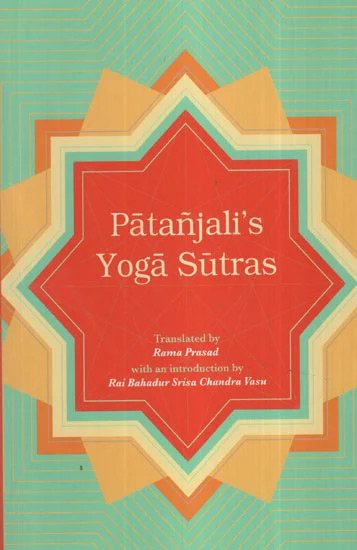Yoga-sutras (with Vyasa and Vachaspati Mishra)
by Rama Prasada | 1924 | 154,800 words | ISBN-10: 9381406863 | ISBN-13: 9789381406861
The Yoga-Sutra 4.29, English translation with Commentaries. The Yoga Sutras are an ancient collection of Sanskrit texts dating from 500 BCE dealing with Yoga and Meditation in four books. It deals with topics such as Samadhi (meditative absorption), Sadhana (Yoga practice), Vibhuti (powers or Siddhis), Kaivaly (isolation) and Moksha (liberation).
Sūtra 4.29
Sanskrit text, Unicode transliteration and English translation of Sūtra 4.29:
प्रसंख्यानेऽप्य् अकुसीदस्य सर्वथा विवेकख्यातेर् धर्ममेघः समाधिः ॥ ४.२९ ॥
prasaṃkhyāne'py akusīdasya sarvathā vivekakhyāter dharmameghaḥ samādhiḥ || 4.29 ||
prasaṇkhyāne—in the highest intellections, api—even, akusīdasya—having no interest left, sarvathā—constant, vivekakhyāteḥ—from discrimination. Dharma meghaḥ—the cloud of virtue, samādhiḥ—the trance.
29. Having no-interest left even in the Highest-Intellection there comes from constant discrimination, the trance known as the Cloud-of-Virtue.—189.
The Sankhya-pravachana commentary of Vyasa
[English translation of the 7th century commentary by Vyāsa called the Sāṅkhya-pravacana, Vyāsabhāṣya or Yogabhāṣya]
[Sanskrit text for commentary available]
When this Brāhmaṇa has no interest left in the Highest Intellection, i.e., desires nothing even from that, then unattached even to that, he has discriminative knowledge ever present, and thus by destruction of the seed-power of potencies, other thoughts are not born. Then does he attain the trance known as the Cloud-of-Virtue.—189.
The Gloss of Vachaspati Mishra
[English translation of the 9th century Tattvavaiśāradī by Vācaspatimiśra]
Thus the author of the Aphorism having described the Highest Intellection to be the means of the restraint of outgoing activities, now speaks of the means of restraining even the Highest Intellection:—‘Having no interest left even in the Highest Intellection there comes from constant discrimination the trance known as the Cloud of Virtue.’ By that Highest Intellection, he does not desire the possession of anything, even of the power of becoming the master of all existence. Nay he begins to feel pain even there. Having become desireless even there by seeing the defect of change, he comes to the possession of constant discriminative knowledge (undisturbed). Explains the same:—‘Thus unattached even to that, &c.’ As long as the notions of outgoing activities exist, the Brāhmaṇa does not come to possess the constant manifestation of discriminative knowledge. When however ho arrives at the stage when all other thoughts cease to exist, then he becomes possessed of Constant discriminative knowledge. Then comes to him the trance known as the Cloud of Virtue (dharma-megha). This is the meaning. Dissatisfied with the Highest Intellection and desiring restraint of that even, let him practise the trance known as the Cloud of Virtue. By the practice of that he becomes constantly possessed of discriminative knowledge.—29.
